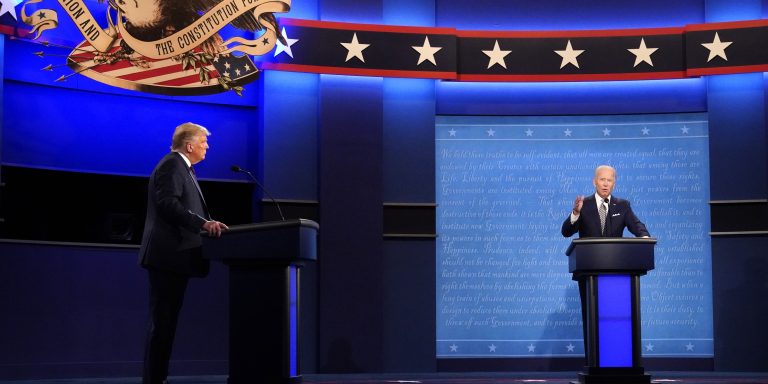INTELBRIEF
October 13, 2020
IntelBrief: Middle East Absent from the U.S. Election

Bottom Line up Front
- With selected exceptions, discussion of U.S. policy in the Middle East region has been absent from the U.S. presidential election campaign.
- The lack of U.S. debate over Middle East policy reflects public fatigue over the costly U.S. military interventions there since the September 11 attacks.
- The Administration’s facilitation of an agreement by the UAE and Bahrain to normalize relations with Israel has not altered the U.S. campaign.
- On the one regional issue that has been significantly discussed – Iran policy – President Trump and former Vice President Biden differ sharply.
In past U.S. presidential elections races, foreign policy issues, and Middle East policy in particular, were central to the U.S. debate. In 2020, the region has barely registered during the campaign season, with the possible exception of U.S. policy toward Iran. There has been little debate over the Trump administration’s announced drawdown of U.S. forces from both Iraq and Afghanistan – countries in which the United States conducted significant military interventions following the September 11, 2001 attacks on the United States. The withdrawals represent Trump’s efforts to fulfill his 2016 campaign promises to extricate the United States from the region’s ‘endless wars.’ The drawdowns come despite the fact that threats to U.S. interests persists in both countries, and after the deaths of more than 7,000 U.S. military personnel and at least two trillion dollars spent in the two theaters.
The relative lack of campaign discussion of the Middle East reflects a U.S. public perception that the human and financial costs of U.S. interventions in the wider region since the September 11 attacks have been disproportionate to the gains achieved. The extensive U.S. involvement in the region has not appeared to further U.S. interests or produce stability. Even after the U.S. interventions, and billions of dollars in yearly foreign aid to the region, the broader Middle East still hosts several failed states and seemingly intractable conflicts including in Syria, Yemen, Iraq, Afghanistan, Lebanon, and Libya. The Israelis and the Palestinians appear further apart than ever, in spite of 50 years of U.S. diplomacy to try to achieve a ‘two-state solution.’ And, the U.S. public and political establishment are well aware that the United States has far less need for the region’s energy resources than it did even ten years ago.
Tellingly, prominent Washington D.C. research institutes (‘think tanks’) that focus on the region have not, as they often have during past election seasons, produced reports containing sweeping recommendations for a comprehensive U.S. ‘strategy’ in the Middle East. The apparent absence of such reports reflects regional experts’ recognition that the U.S political establishment is no longer willing or able to invest the vast financial and diplomatic resources needed to restructure the region to the U.S. advantage. Neither President Trump nor Democratic presidential candidate Joseph Biden has given a campaign speech during the campaign laying out a comprehensive vision for U.S policy in the region. Yet, experts assess that both Russia and China are increasingly encroaching on the region and diluting U.S. influence there. A further indication of the declining salience of the region is the lack of apparent effect on the election campaign of the September agreements for the United Arab Emirates (UAE) and Bahrain to normalize relations with Israel. The Administration held a highly publicized signing ceremony of the so-called ‘Abraham Accords’ at the White House on September 15, 2020, hoping in the process to advertise its success in producing at least some diplomatic breakthroughs in the region. However, the diplomatic achievement did not appear to alter the shape of the presidential election race or spark a broader debate on how the United States can achieve peace between Israel and the Palestinians.
The one regional issue on which sharp contrasts have emerged is that of Iran, and in particular the U.S. stance on the 2015 multilateral Iran nuclear agreement. The Trump administration abrogated the accord in May 2018, primarily on the grounds that the accord was narrowly focused on the Iranian nuclear program and provided sanctions relief that Iran could use to challenge U.S. interests. The Trump administration has identified Iran as a significant U.S. nemesis whose challenges can only be met by applying ‘maximum pressure’ on Iran’s economy through comprehensive sanctions. The Obama administration considered the accord a major product of two years of diplomacy with Iran that rolled back Iran’s nuclear program and, it argued, reduced the overall strategic threat from Iran. Not surprisingly, Mr. Biden, who was Vice President under President Obama, issued an editorial on September 13, 2020 endorsing the accord’s benefits and committing to rejoin the pact if he is elected. The sharp differences have attracted the intense attention of Iran’s leaders who hope that the U.S. election will result in sanctions relief that have caused significant economic damage, but have not led Tehran to change its regional strategy.